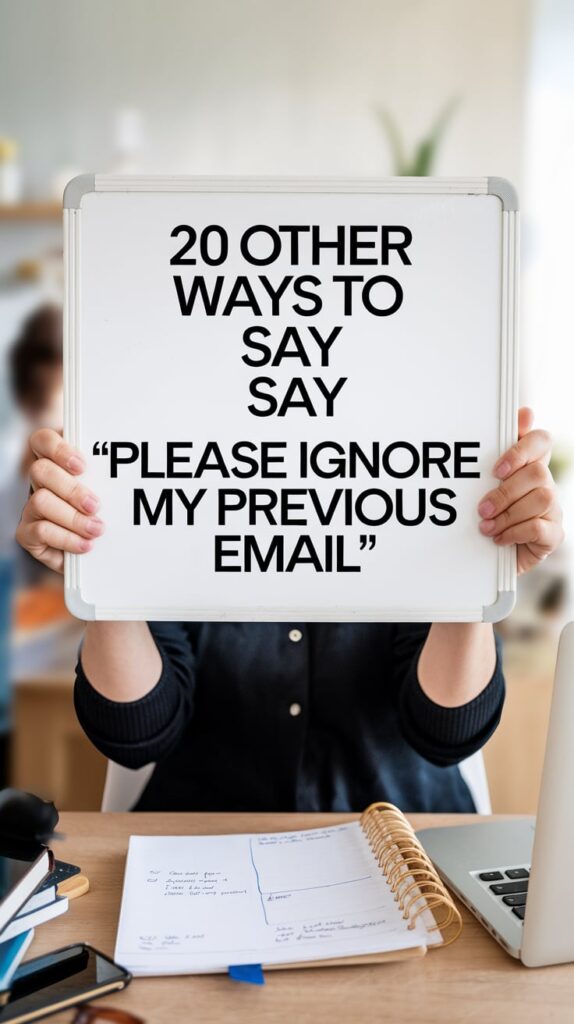Introduction
In the realm of professional communication, mistakes are inevitable. Whether it’s sending an email with incorrect information, outdated links, or even a poorly worded request, the need to correct oneself can arise at any moment. This is where the phrase “Please ignore my previous email” often comes into play.
However, using varied expressions not only enhances clarity but also keeps your communication engaging and professional. In this comprehensive guide, we’ll explore 20 other ways to say “Please ignore my previous email” and provide detailed scenarios to illustrate their use.
like more : Other Ways To Say “Congratulations To Both of You” – Grammar Beacon
Why Should We Say This and Not Say This?
Opting for alternative phrases to express the idea of disregarding a previous email serves multiple purposes. First, it demonstrates a level of professionalism that can enhance your reputation.
Second, it helps to establish a friendly rapport with your audience. Rather than sounding robotic or formulaic, varied language can make your communication feel more human and relatable.
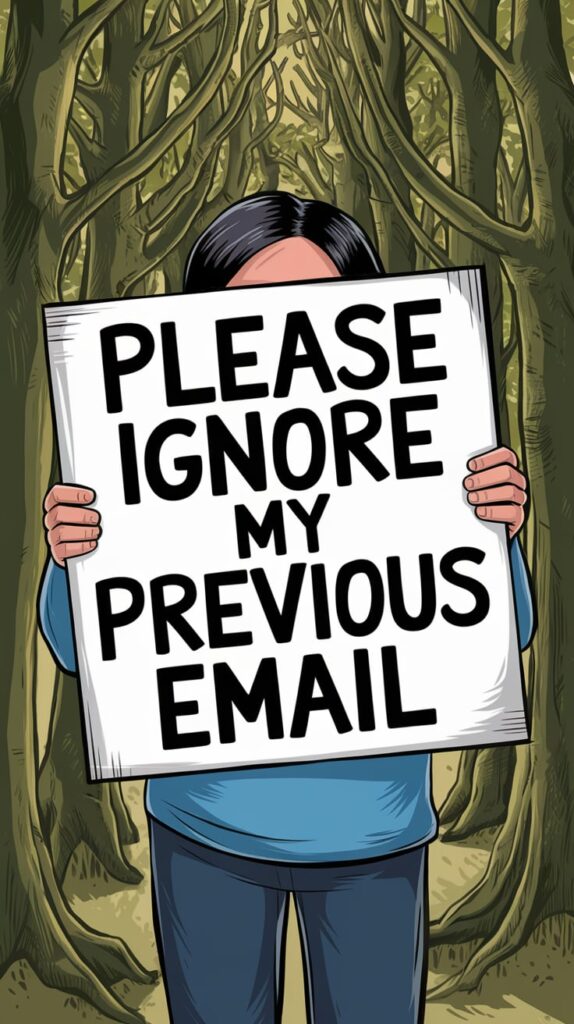
The Importance of Tone
The tone of your message matters. A request to ignore a previous email can come across as curt or dismissive if phrased poorly. By using softer, more varied language, you can convey your message while maintaining a polite tone.
This approach not only clarifies your intent but also shows respect for the recipient’s time and attention.
Building Relationships
In professional settings, building strong relationships is crucial. Using phrases that promote clarity and politeness helps create a positive atmosphere.
By adopting a conversational style, you show that you value the recipient’s understanding and engagement, which can enhance your working relationship.
List of Synonyms of “Please Disregard My Previous Email”
Here, we’ll dive deeper into the 20 other ways to say “Please ignore my previous email.” Each phrase will be examined with a context that shows its effectiveness in communication.
like more : 10 Other Ways to Say “Happy New Month” – Grammar Beacon
1. Disregard My Previous Message
This phrase is a straightforward way to request that someone overlook your last message.
Scenario: Imagine you sent a project update that included incorrect deadlines. You could follow up with, “Disregard my previous message regarding the project timelines; I’ll provide the correct information shortly.”
Why It Works: This expression is direct but still polite, making it suitable for most professional contexts.
2. Ignore My Last Email
A more casual option, this phrase fits well in informal settings or among colleagues you know well.
Scenario: You accidentally scheduled a meeting for a time when your colleague was unavailable. You might say, “Ignore my last email about the meeting; I just realized you’re booked at that time.”
Why It Works: The casual tone helps soften the request, making it feel less formal.
3. Please Disregard My Earlier Correspondence
This phrase adds a layer of formality, making it suitable for official communications.
Scenario: If you sent out a report with incorrect figures, you might follow up by stating, “Please disregard my earlier correspondence about the budget numbers; I’ll send a revised report shortly.”
Why It Works: The formal tone conveys professionalism and respect.
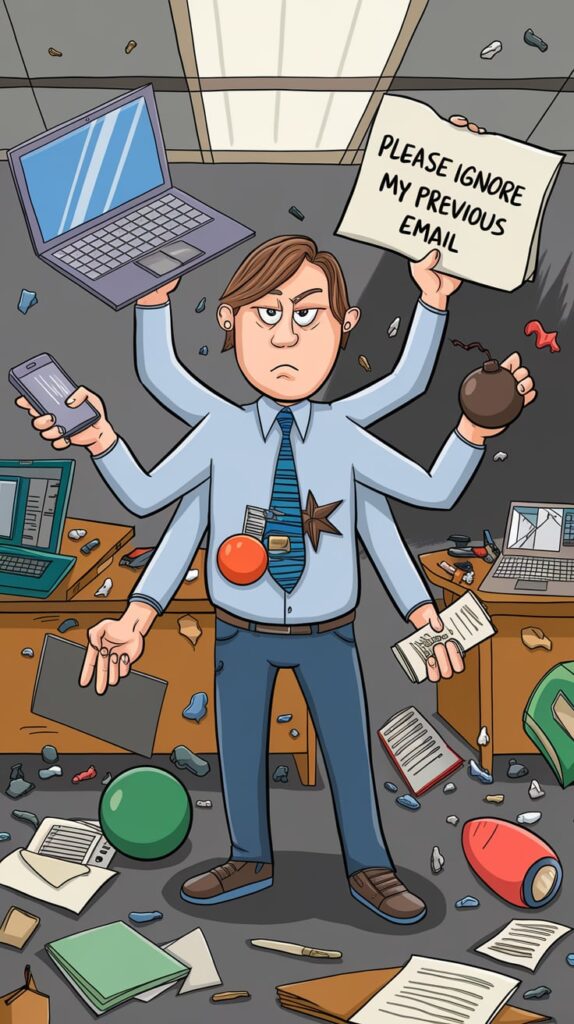
4. Kindly Disregard My Previous Email
Incorporating “kindly” softens the request, making it more polite.
Scenario: You realize that the information in your last email about a training session was outdated. You could write, “Kindly disregard my previous email about the training session; the schedule has changed.”
Why It Works: This phrase invites cooperation and fosters a sense of goodwill.
5. I Apologize for Any Confusion Caused by My Previous Email
Taking responsibility adds weight to your request, making it more impactful.
Scenario: If your last email led to misunderstandings about a project, you might say, “I apologize for any confusion caused by my previous email regarding the project requirements; please refer to this updated document.”
Why It Works: Acknowledging potential confusion enhances your credibility and professionalism.
6. Let’s Disregard My Previous Message
This informal phrase lightens the tone, making it suitable for friendly exchanges.
Scenario: If you mistakenly proposed a strategy that was impractical, you could say, “Let’s disregard my previous message about the project strategy; I’ve come up with a more effective approach.”
Why It Works: This casual tone can ease any tension and promotes collaboration.
7. My Apologies, Please Disregard My Previous Email
A straightforward request that maintains professionalism while acknowledging an error.
Scenario: After sending an email with the wrong attachment, you might follow up with, “My apologies, please disregard my previous email that included the incorrect document; here’s the right one.”
Why It Works: This phrasing combines apology and clarity, making your intent unmistakable.
like more : Other Ways to Say Have a Nice Evening – Grammar Beacon
8. Please Disregard the Email I Sent Earlier
A simple and effective way to clarify a previous mistake.
Scenario: If you sent a reminder for an event that’s been canceled, you could write, “Please ignore my previous the email” I sent earlier about the event; it has been canceled.”
Why It Works: Clarity is key, and this phrase directly addresses the issue without unnecessary fluff.
9. Disregard My Previous Communication
A more formal phrase that’s suitable for official correspondence.
Scenario: If you shared outdated statistics in a meeting follow-up, you might say, “Disregard my previous communication regarding the sales data; I have updated figures.”
Why It Works: This expression maintains a formal tone while addressing the mistake.
10. I’d Like to Retract My Previous Email
This phrase works well when you want to formally take back your earlier communication.
Scenario: After realizing your earlier email included inaccurate information, you might state, “I’d like to retract my previous email regarding the client feedback; the correct details are attached.”
Why It Works: It clearly states your intent to retract, promoting transparency.
11. Disregard My Earlier Email on This Matter
A useful phrase when dealing with specific issues.
Scenario: If you realize a policy change has occurred after sending a related email, you could write, “Disregard my earlier email on this matter; we have updated guidelines to follow.”
Why It Works: This phrase focuses on the specific issue at hand, providing clarity.
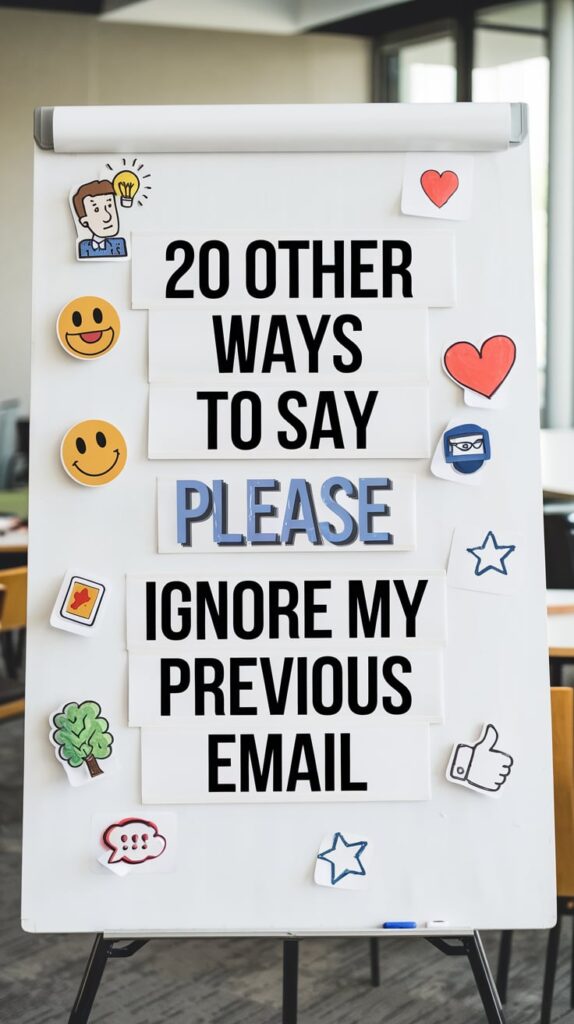
12. Please Disregard the Email I Sent a Moment Ago
This is particularly useful for correcting recent mistakes.
Scenario: If you sent an email with incorrect meeting details moments ago, you might say, “Please disregard the email I sent a moment ago regarding the meeting; I had the wrong time.”
Why It Works: The reference to timing makes it clear that you’re addressing a very recent error.
13. Can You Ignore My Previous Message?
A more conversational way to ask someone to overlook a previous email.
Scenario: If you sent a note asking for a report too early in the process, you might follow up with, “Can you ignore my previous message? I jumped the gun; we’re still finalizing the details.”
Why It Works: This phrasing is casual and friendly, which can encourage a positive response.
14. Please Disregard the Last Email I Sent
This straightforward phrase emphasizes the specific email being referenced.
Scenario: If you mistakenly shared incorrect feedback on a project, you could write, “Please disregard the last email I sent regarding the feedback; I have revised my thoughts.”
Why It Works: Directness enhances clarity and reduces potential confusion.
15. I Apologize; Please Disregard My Previous Email
An effective way to combine an apology with a request for clarification.
Scenario: If your earlier email included misleading information about deadlines, you might say, “I apologize; please disregard my previous email concerning the deadlines; I have updated information.”
Why It Works: This phrase emphasizes accountability while clearly stating your intent.
16. Kindly Disregard My Earlier Message
This phrase conveys politeness and professionalism.
Scenario: If you realize that a previous suggestion was impractical, you might say, “Kindly disregard my earlier message about the project approach; I’ve thought of a more viable solution.”
Why It Works: It invites cooperation and makes the recipient feel respected.
17. Please Ignore my previous Email, I Sent Before This One
This phrase specifies the timeline of your communications clearly.
Scenario: If you sent an email that doesn’t reflect your current thoughts, you might say, “Please ignore my previous email I sent before this one; I’ve reconsidered my stance.”
Why It Works: It provides a clear reference point, making it easy for the recipient to follow.
18. Let’s Pretend My Previous Email Didn’t Happen
A light-hearted approach that can ease the situation.
Scenario: If your earlier email was sent by mistake or contained irrelevant content, you might say, “Let’s pretend my previous email didn’t happen; here’s what I intended to convey.”
Why It Works: Humor can diffuse tension and foster a more collaborative environment.
19. I Retract My Earlier Email; Please Disregard
A formal acknowledgment of the mistake that also requests the email be overlooked.
Scenario: After realizing your earlier advice was incorrect, you might say, “I retract my earlier email; please disregard that suggestion; I have more accurate information now.”
Why It Works: This phrase conveys professionalism and a commitment to accuracy.
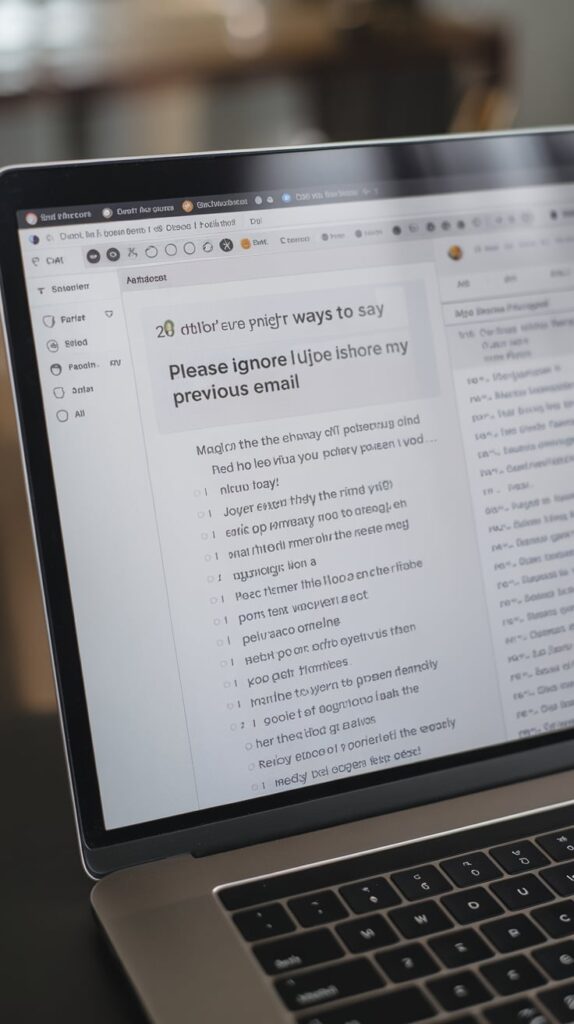
20. Please Disregard the Message I Sent Previously
This phrase is clear, straightforward, and effective in professional communication.
Scenario: If you sent an email with outdated links, you could follow up with, “Please disregard the message I sent previously regarding the resources; here are the updated links.”
Why It Works: Directness
ensures clarity, reducing the likelihood of misunderstandings.
Conclusion
Effective email communication is a vital skill in the workplace. Knowing how to navigate mistakes and correct them politely can make a significant difference in your professional relationships,
By using these 20 other ways to say “Please ignore my previous email,” you can enhance your communication style while ensuring clarity and professionalism.
Understanding when to use different expressions can elevate your correspondence and make your messages more engaging. Consider the context, your relationship with the recipient, and the level of formality required.
By varying your language, you not only improve the effectiveness of your communication but also demonstrate your attention to detail and respect for the recipient.
Ultimately, the goal is to foster understanding while maintaining a friendly, professional tone. Whether you choose to be formal or casual, remember that your words carry weight. By adopting these varied phrases, you’ll navigate the challenges of email communication with ease and grace, leaving a positive impression on your audience.
So, the next time you find yourself needing to ask someone to disregard a previous message, refer back to this list. Choose the phrase that best suits your style and situation, and watch how it enhances your communication efforts. Happy emailing!

James Logan is a seasoned blogger and language enthusiast behind Grammar Beacon. With years of experience in grammar and writing, James shares his expertise through insightful and engaging content. His passion for clear communication and linguistic precision shines in every post, making complex grammar concepts accessible and enjoyable for readers. Follow James for expert advice and tips to refine your writing skills.

